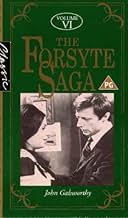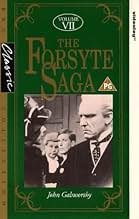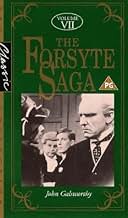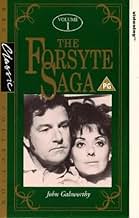The Forsyte Saga
- Série de TV
- 1967
- 50 min
Adicionar um enredo no seu idiomaSpanning decades, the saga contrasts obsessive Soames, clinging to wife Irene, and Jolyon, leaving for his kids' governess. Their diverging paths intertwine, bringing highs and lows to the u... Ler tudoSpanning decades, the saga contrasts obsessive Soames, clinging to wife Irene, and Jolyon, leaving for his kids' governess. Their diverging paths intertwine, bringing highs and lows to the upper-class Forsyte clan.Spanning decades, the saga contrasts obsessive Soames, clinging to wife Irene, and Jolyon, leaving for his kids' governess. Their diverging paths intertwine, bringing highs and lows to the upper-class Forsyte clan.
- Ganhou 1 Primetime Emmy
- 4 vitórias e 3 indicações no total
Avaliações em destaque
Soames may be loathsome in the early episodes, but age and a life of disappointment soften him into an admirable, if wintry, human being. Whereas Kenneth More's Jolyon and Nyree Dawn Porter's Irene seem more and more complacent and sanctimonious, especially in those scenes where Jolyon expounds endlessly on the need for freedom in human relations to a nodding, dewy-eyed Irene. Yet these two goody-goodies forbid their son Jon to pursue his love for Fleur! What is Jolyon, but a breezy, if fundamentally decent, charmer who blunders his way into an inherited fortune? And what is Irene, but a spineless beauty who cannot cope with the depth of Soames' feelings? (But then, who could?)
Other than the scenes where Soames appears, the later episodes relax. Nicholas Pennell is admirable as Michael Mont, the aristocrat with a heart-of-gold who marries the wayward Fleur (Susan Hampshire) and unintentionally causes endless unhappiness. His character underscores Galsworthy's essentially skeptical view of human endeavor. The outstanding cast included some of Britain's best performers of its day. Some went on to bigger things, such as the game Ms. Hampshire, but a review of the cast's vital statistics reveals that many have already passed away. This is their legacy.
Forget the recent remake and after about ten minutes you'll certainly forget that this is thirty-odd years old and made in black and white. Maybe its high-class soap opera but even so its all class.
Truly a saga spanning four or five generations, the story is dominated by Eric Porter's Soames, the cold venal rapist who eventually commands our grudging respect and the truly beautiful Irene played by Nyree Dawn Porter, Soames' victim who later finds love. And then there's Susan Hampshire's pretty but totally selfish Fleur, drawing you eye whenever she's on-screen. Incidentally, Nicholas Pennell plays Fleur's husband as if he was Wilfred Hyde-White in My Fair Lady! There are many other major characters, all well portrayed and you'll really care what happens to them.
Even the make-up of the two Porters is worth a word of praise as they age convincingly.
A minor criticism I could make is the rather eccentric recording of the sound. The dialogue level soars and drops as if the microphones were concealed in flowerpots like the early talkies. Doors slam loudly and there are unidentified knocks and bangs in the background.
See this masterpiece of television if you can, I don't think it has been bettered.
The series is adapted from six novels and three short stories by John Galsworthy about the Forsyte family of upwardly mobile Britishers in the late 19th-early 20th century, focussing in particular on the "Man of Property," Soames Forsyte (Eric Porter), who mistakes possession for love until he finally has a child, the spoiled yet totally captivating Fleur (Susan Hampshire). The adaptation is mostly faithful, though it opens with three episodes not in the original novels but dramatizing their backstory. In addition, Soames's first wife, Irene (the utterly amazing Nyree Dawn Porter), is more of a presence in the final chapters than she was in the later books.
If you ever get a chance to see this series (I don't think it's availabe on video at present), jump at it. The story is epic in scope yet quite moving on the personal level as Galsworthy traces the tortuous relationships of this large Victorian family in a manner that would make most soap opera writers green with envy.
The first three books concentrated on the property-driven first generation Forsyte men, whose world was broken up by a beautiful woman called Irene, "a concretion of disturbing Beauty impinging on a possessive world," as Galsworthy puts it in his preface. But it is also a saga that brings us from the Victorian world in the 1880s up to the 1920s when the new generation finds new values.
Now this is very difficult stuff to reduce to a miniseries, but that is what BBC did quite successfully back in the 1960s and the television audience on both sides of the Atlantic went wild. For half a year, given a 50-minute episode each week for 26 weeks, they sat fascinated as they watched the fortunes of the Forsytes, man and woman, grasping, losing, growing older, having children who suffered from what their parents had done, some finding happiness at last, some settling for second best, but all interesting and very human. It is said that the idea of British miniseries based on famous novels is what prompted PBS to create Masterpiece Theatre to satisfy the demand. (Coincidentally, at the time of this writing, the very first Masterpiece Theatre, "The First Churchills," is due at the time of this writing to come out on DVD from Acorn Media!)
I am sure many of you have watched the first third of the new version of "The Forsyte Saga" complete with color, the obligatory scenes in bed, and horse manure carefully piled up in the streets of London. Be advised that the 1967 version is a studio version, with several location shots, in glorious black and white, with a cast that is simply hard to beat or even match, and a tendency to be wonderfully addictive.
I have viewed the DVD version on 7 discs released by Warner Home Video on the BBC label. (Yes, that is 1300 minutes in all, followed by 2 hours of spellbinding, often extremely funny, "bonus" material on the 7th disc.) If you prefer video tapes, the series comes in two sets: The First Generation on 6 tapes, The Second Generation on 7 tapes. They do not contain any of the extra material, so be advised. Technically, the picture has been beautifully restored except for a second here and there when there is a slight blur, perhaps 10 seconds worth out of more than 21 hours hours, and now and then the sound does get a bit fuzzy. In fact, I remember that being true when this series was first telecast, so that is no fault of this restoration.
The major stars are Eric Porter (Soames Forstye), Nyree Dawn Porter (Irene), Kenneth Moore (young Jolyon Forsyte), and a pretty actress who made her reputation in this series, Susan Hampshire. I cannot begin to list the rest, all of which you can catch during the end titles and much of which you can find on the Internet Movie Data Base. Porter plays to perfection the "unlovable" man who cannot understand why he is so; and as the story unfolds, his partial mellowing, as played by Porter, is an example to all "modern" actors.
In the book, Irene is seen only through the consciousness of the other characters, and as good as Ms. Porter looks as Irene, her acting is a touch wooden for such a catalytic character. Still she looks far more striking than her counterpart in the 2002 version.
Galsworthy has been compared with Thackery, but he does not quite have the sweep of that earlier author. Still, the scene at a party after a lawsuit in which the loser is attracting all the attention while the winners are being cold-shouldered by their so-called friends is both painful and telling. (In fact, if it makes you think of "Chicago," you can see how far ahead Galsworthy was in his estimation of how we treat "morality.")
Of course this is high class soap opera, but the production values are quite good for a 1967 studio production, the acting superb, and the dialogue a bit more intelligent than you will find in the afternoon on commercial series. This set, on tapes or DVDs, is a real "grabbit." It afforded me nearly 22 hours of viewing pleasure and will do the same for you.
Você sabia?
- CuriosidadesEach episode was rehearsed for two weeks.
- Citações
Jolyon 'Jo' Forsyte: I'm not a true Forsyte. I'm a bit of a mongrel. I put the ha'pennies on my cheques, not take them off.
- ConexõesFeatured in Night of a Thousand Shows (2000)
- Trilhas sonorasHalcyon Days
(uncredited)
(from the suite 'The Three Elizabeths')
Composed by Eric Coates
Conducted by Marcus Dods
[series theme tune]
(theme music)
Principais escolhas
- How many seasons does The Forsyte Saga have?Fornecido pela Alexa
Detalhes
- Tempo de duração50 minutos
- Cor
- Proporção
- 1.33 : 1
Contribua para esta página



































